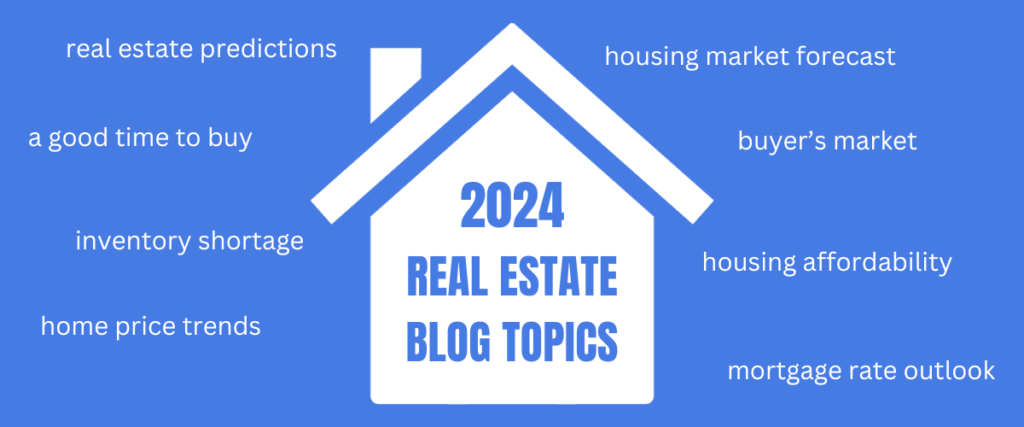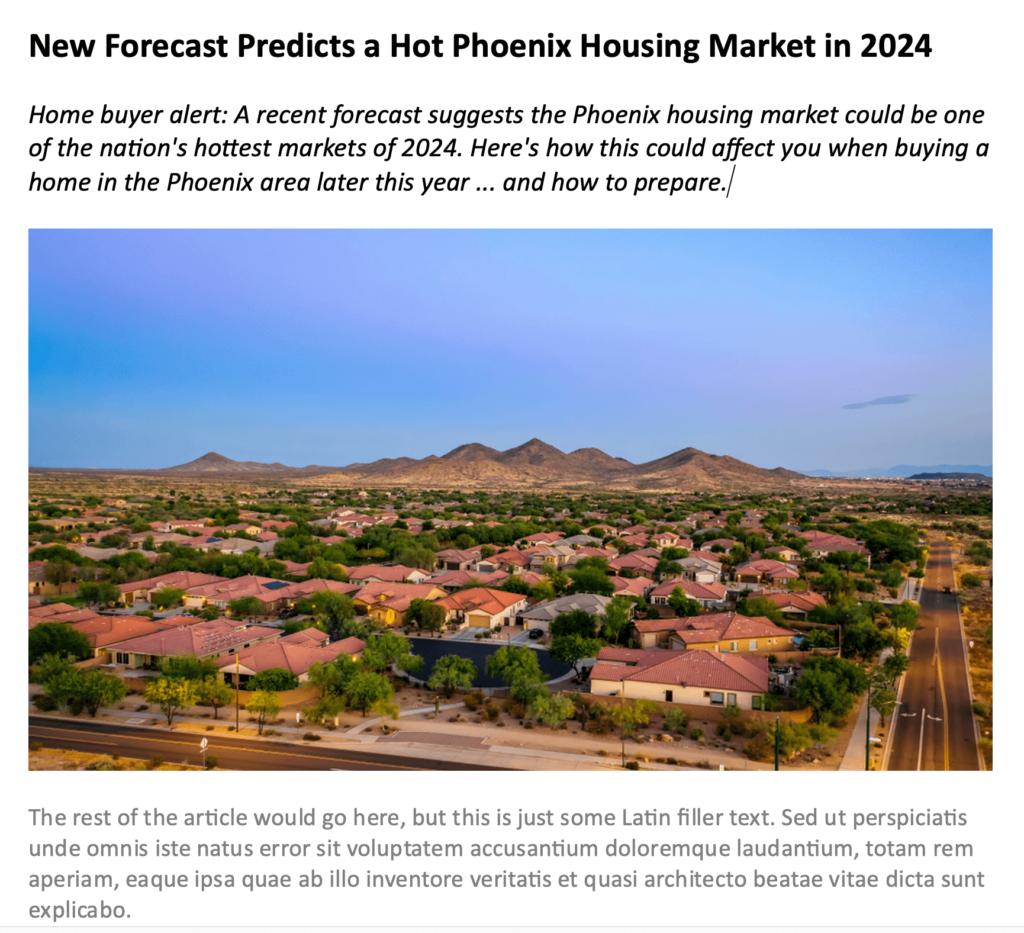There are dozens of articles online that explain how to write a real estate blog post, and many of them do a good job covering the basics. Now it’s time for the advanced class…
Below, you’ll learn how to write a real estate blog post that (A) differentiates you from competitors, (B) ranks higher in the search engines, and (C) helps you convert more of your visitors into clients.
Here’s How to Write a Real Estate Blog Post
Take it from someone who has written thousands of real estate blog posts over the years. If you want to break away from the pack and gain the attention of local home buyers or sellers, you’ll need to work smarter, write better, and deliver superior content.
This 10-step guide shows you how to accomplish all of these things—and more.
1. Get your blog program up and running.
You can’t launch a real estate blogging campaign without a blog program. If you already have one installed on your site—great. Just go with that.
If you don’t yet have a blogging program, do yourself a favor and choose WordPress. It’s open source, free to use, and arguably the most sophisticated content-management system available today. It’s also simple to use, even for beginners.
Read: The Agent’s Guide to WordPress
You can save yourself a lot of hassle by having your web hosting company install the program for you. Most of the major web hosts have some kind of “easy install” feature for WordPress, and some will actually do the installation for you.
Website hosting companies that offer one-click installation or auto-setup for WordPress include: Bluehost, HostGator, SiteGround, DreamHost, and WP Engine (among others).
With the technical matters out of the way, let’s talk about how to write a real estate blog post that increases website traffic and delivers leads.
2. Choose a blog post topic through careful research.
The first step in this process is to choose a specific topic you want to write about. Ideally, this topic will mirror the questions and concerns of your target audience.
Don’t choose topics at random. If you want to write the kind of real estate blog posts that actually attract local home buyers or sellers, you have to get inside their heads.

There’s no guesswork here. You can use keyword research tools, Google’s autocomplete predictions, and other tools to discover the search phrases used by your intended audience. Write real estate blog posts that match those subjects, and you’ll end up with more traffic, visibility and exposure.
I’ve written a separate post about the best real estate blog topics based on market trends and consumer research patterns. So be sure to read that before you leave.
3. Anticipate audience questions and concerns.
I touched on this above, but it deserves a closer look. If you want to learn how to write real estate blog posts that attract and engage readers, you have to know what interests them.
- What are their primary real estate goals and objectives?
- What are their biggest fears or concerns?
- What kind of information do they need to succeed?
An example: A first-time home buyer might want to know who pays which closing costs in their city and state. If you write a detailed blog post that answers this question, you’ll attract people who are researching the subject.
Repeat the process for other questions and concerns, by writing more real estate blog posts. There’s no limit to how far you can go with this strategy, or how much traffic you can earn from it.
4. Write an enticing, keyword-rich blog post title.
Blog post titles are an important ranking factor for search engine visibility. If you want to write a real estate blog post that shows up in search engine results for a specific phrase, that phrase should be included within the title.
When you write a blog post title, your blogging program or content-management system will convert it into an HTML title tag. This happens automatically, without any extra effort from you. Search engines use title tags to determine what a particular page is about, and to display it for relevant search queries.
More importantly, the title tells readers what the blog post is about and entices them to keep reading. If the title closely matches the question or concern they have in mind, they’ll know they are in the right place.
5. Write a descriptive, keyword-rich intro paragraph.
Next, you’ll want to write an effective summary paragraph for your real estate blog post.
Okay, so what does “effective” mean.
It means the summary paragraph should (A) provide a brief overview of what the blog post is about and (B) entice the reader to keep reading.
From a presentation standpoint, you might want to bold, italicize, and/or enlarge the introductory paragraph so that it grabs the reader’s attention. You could even include a “teaser” to motivate the reader to continue, as long as it’s relevant and not gimmicky.
Here’s an example summary paragraph for a real estate blog post that accomplishes all of these things.

Notice that this intro paragraph also includes the keywords for this particular blog post, building off the title. This gives search engines even more input about the article’s primary focus and will help the blog post rank well for those types of searches.
Most importantly, this summary hooks the reader by promising to reveal useful insights that could affect them directly, when they enter the market.
6. Explain the topic better than other bloggers.
The previous steps explain how to write a real estate blog post. But if you want your blog content to stand out on a crowded internet, you have to go way beyond the basics.
Once you’ve identified a topic to write about, do a Google search to find similar articles that already exist online. Consider it a pre-publication reconnaissance mission.
If you’re publishing local real estate content relating to your city, or even a specific community, you might not find a lot of pre-existing articles online. That’s a win for you, because it gives you a better chance of ranking well for relevant searches.
If you do find similar articles already online, analyze them to see what kind of information they provide. And then ask the following questions:
- How can I do a better job covering this topic?
- How can I make my content more useful for readers?
- How can I write a real estate blog post that truly stands out?
This will require more work on your part. You’ll have to gather more information, write a longer and more detailed post, and spend more time on formatting.
But the long-term results are worth it. High-quality real estate blog content tends to rise to the top of search engines while attracting more links from other sites. Over time, this will bring more traffic and greater exposure for your business.
7. Localize your blog post with relevant city verbiage.
Real estate is a local business. Agents and brokers typically serve a specific geographic area, like a city, community or metro area. Keep this in mind when you write your real estate blog posts.
Also remember that local home buyers and sellers often conduct hyper-local searches in Google, Yahoo and Bing. They’ll Google things like “Atlanta housing market outlook for 2024” or “best Seattle neighborhoods for young professionals.”
This is important for search engine optimization, as well. If you write a real estate blog post that talks about “the housing market” or “our real estate scene”—without a city name—search engines won’t be able to connect your content to your local area. So you probably won’t show up for very many local search queries. Mission failure.
Here’s an easy way to check a blog post for keyword usage:
- Once you’ve completed your draft, use the “Ctrl+F” (on a PC) or “Command+F” (on a Mac) to open the find function.
- Enter your most important key phrase in the search box.
- Use the arrows to index through your blog post to see where those phrases appear.
- If you find a section that’s several paragraphs long but doesn’t feature the key phrase, find a way to incorporate it.
- Make sure the key phrase appears in the blog post title, the first paragraph, several times throughout the body, and also toward the end of the article.
You don’t need to aim for a specific number of keyword inclusions. Just write naturally, like you’re explaining something to a friend, and work in the phrases where appropriate.
8. Use analytics to track results and optimize your strategy.
We’ve talked about how to write a real estate blog post, and how to get the best results over time. But how do you know if it’s actually working?
How do you determine which blog posts are generating the most interest and traffic? Or how long people are spending on each page? How do you measure results?
This is where website analytics comes into the picture.
You can use a website analytics program like Google Analytics to determine which articles are most popular with your target audience, and also to identify additional blogging topics.
If you write a real estate blog post about a popular neighborhood in your area, and it starts to generate traffic and even some inquiries—that’s a topic worth repeating! You could repeat the process for other neighborhoods, or create a compilation article listing the best neighborhoods for certain types of buyers.
But you can’t gain these valuable insights unless you have website analytics installed.
Need Blogging Help?
By now, you should have a better insight into how to write a real estate blog post—and how to get the best results. You can also see that it requires a serious time commitment, with a repeated effort over time.
We can simplify the process by doing the heavy lifting for you. Our real estate content marketing package includes everything you need to take your blogging strategy to the next level, and your business along with it.
Learn more or send an email to editor@homebuyinginstitute.com.
Brandon Cornett
Brandon Cornett is a mortgage content marketing expert with 17 years of experience. He also created the Home Buying Institute, one of the nation's leading informational websites for home buyers.
